Mises, Ludwig von. Human Action: A Treatise on Economics
Подождите немного. Документ загружается.

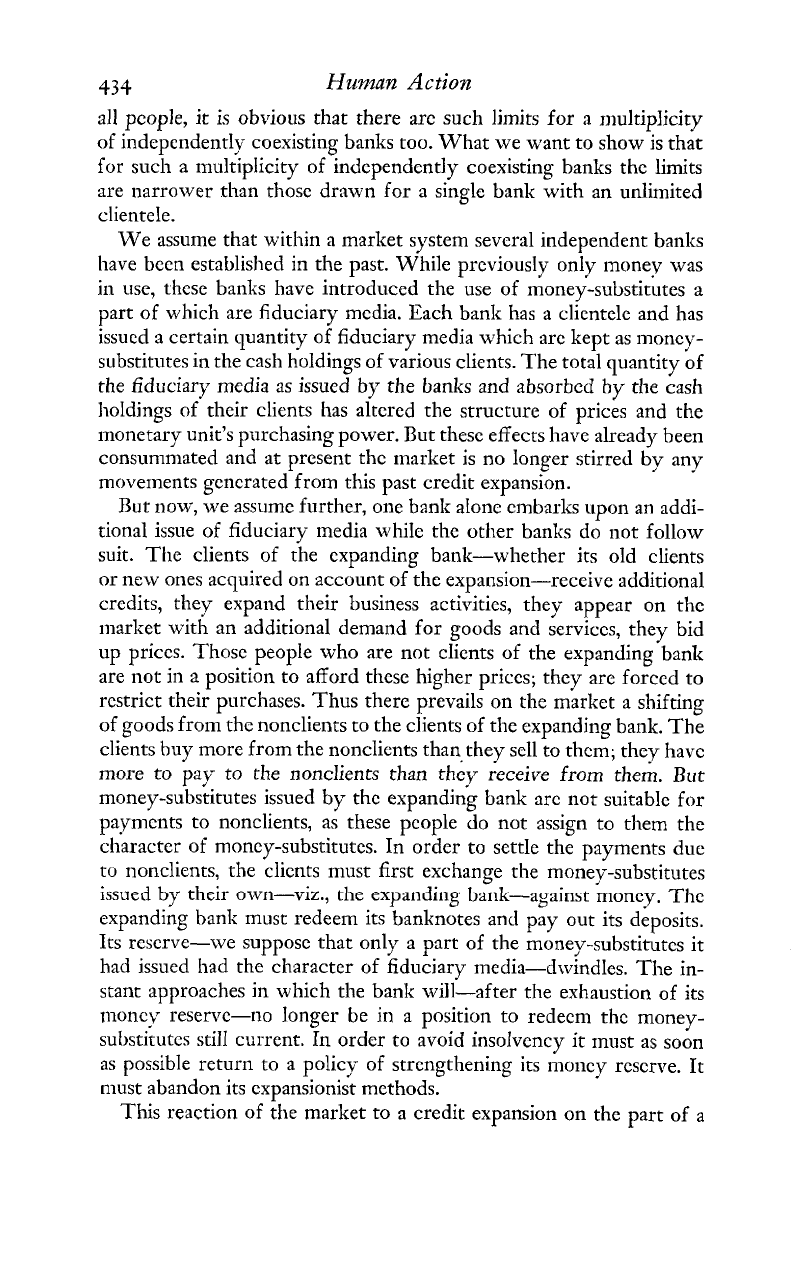
434
Human
Action
all people, it is obvious that there arc such limits for a multiplicity
of indcpendently coexisting banks too. What
we
want to show is that
for such a multiplicity of independently coexisting banks the limits
are narrower than those drawn for a single bank with an unlimited
clientele.
We
assume that within a market system several independent banks
have been established in the past. While previously only money was
in use, these banks have introduced the use of money-substitutes a
part of which are fiduciary media. Each bank has a clientele and has
issucd a certain quantity of fiduciary media which arc kept as moncy-
substitutes in the cash holdings of various clients. The total quantity of
the fiduciary media as issued by the banks and absorbed by the cash
holdings of their clients has altercd the structure of prices and the
monetary unit's purchasing power. But these effects have already been
consumn~ated and at present thc ~narltet is no longer stirred
bv
any
movements gcncrated from this past credit expansion.
But now, we assume further, one bank alone cmbarlis upon an addi-
tional issue of fiduciary media whiIc the other banks do not follow
suit. The clients of the cxpanding bank-whether its old clients
or new ones acquired on account of the expansion-receive additional
credits, they expand their business activities, they appear on the
market with an additional demand for goods and services, they bid
up priccs. Those people who are not clients of the expandingvbank
are not in a position to afford thcse higher priccs; they arc forced to
rcstrict their purchases. Thus there prevails on the market a shifting
of goods from the nonclients to the clients of the expanding bank. The
clients buy more from the nonclients than they sell to thcm; they havc
more to pay to the nonclients than
th&
receive from them.
But
money-substitutes issued by the expand& bank arc not suitablc for
paymcnts to nonclients, as these people do not assign to them the
ch'aracter of moncy-substitutes. In order to settle the payments due
to nonclients, the clients must first exchange the money-substitutes
issued
by
their own-viz., the expanding bank-against moncy. Thc
cxpanding bank must redeem its banknotes and pay out its deposits.
Its reserve-we suppose that only a part of the money-substitutcs it
had issued had the character of fiduciary media-dwindles. The in-
stant approaches in which the bank will-after the exhaustion of its
tnoncy reservc-no longer be in a position to redecm the money-
substitutes stilI current.
In
ordcr to avoid insolvency it must as soon
as possible return to a policy of strengthening its moncy rescrve. It
must abandon its expansionist methods.
This reaction of the market to
a
credit expansion on the part of a
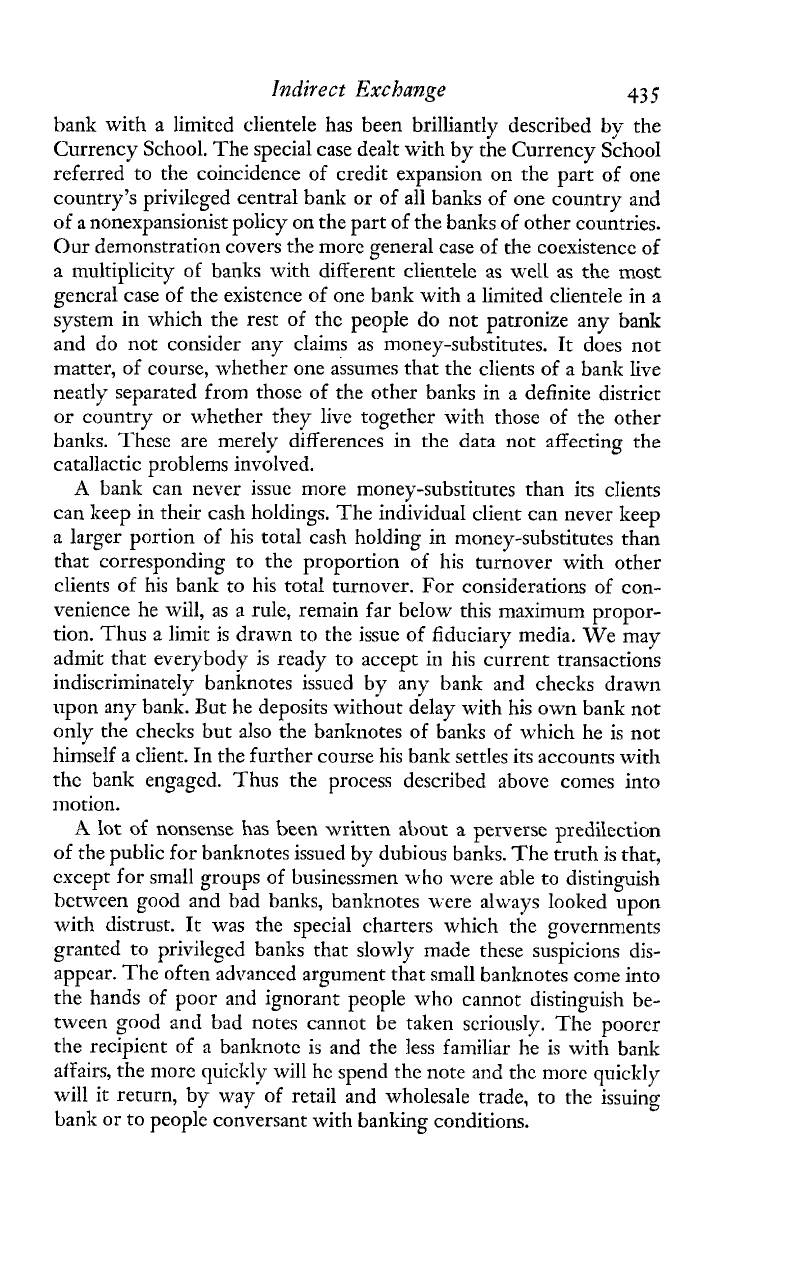
Indirect Exchange
43
5
bank with
a
limited clientele has been brilliantly described by the
Currency School. The special case dealt with by the Currency School
referred to the coincidence of credit expansion on the part of one
country's privileged central bank or of all banks of one country and
of
a
nonexpansionist policy on the part of the banks of other countries.
Our demonstration covers the more general case of the coexistence of
a
multiplicity of banks with different clientele
as
well as the most
general case of the existence of one bank with a limited clientele in
a
system in which the rest of the people do not patronize any bank
and do not consider any claims as money-substitutes. It does not
matter, of course, whether one assumes that the clients of a bank live
neatly separated from those of the other banks in a definite district
or country or whether they live together with those of the other
banks. These are merely differences in the data not affecting the
catallactic problems involved.
A
bank can never issue more money-substitutes than its clients
can keep in their cash holdings, The individual client can never keep
a larger portion of his total cash holding in money-substitutes than
that corresponding to the proportion of his turnover with other
clients of his bank to his total turnover. For considerations of con-
venience he will, as a rule, remain far below this maximum propor-
tion. Thus a limit is drawn to the issue of fiduciary media. We may
admit that everybody is ready to accept in his current transactions
indiscriminately banknotes issued by any bank and checks drawn
upon any bank. But he deposits without delay with his own bank not
only the checks but also the banknotes of banks of which he is not
himself a client. In the further course his bank settles its accounts with
the bank engaged. Thus the process described above comes into
motion.
A
lot
of
nonsense has been written
about
a perverse
predilection
of the public for banknotes issued by dubious banks. The truth is that,
cxcept for small groups of businessmen who were able to distinguish
bemeen good and bad banks, banknotes were always looked upon
with distrust. It was the special charters which the governments
granted to privileged banks that slowly made these suspicions dis-
appear. The often advanced argument that small banknotes come into
the hands of poor and ignorant people who cannot distinguish be-
tween good and bad notes cannot be taken seriously. The poorer
the recipient of a banknote is and the less familiar he is with bank
affairs, the more quickly will he spend the note and the more quickly
will it return, by wai of retail and wholesale trade, to the issuing
bank or to people conversant with banking conditions.
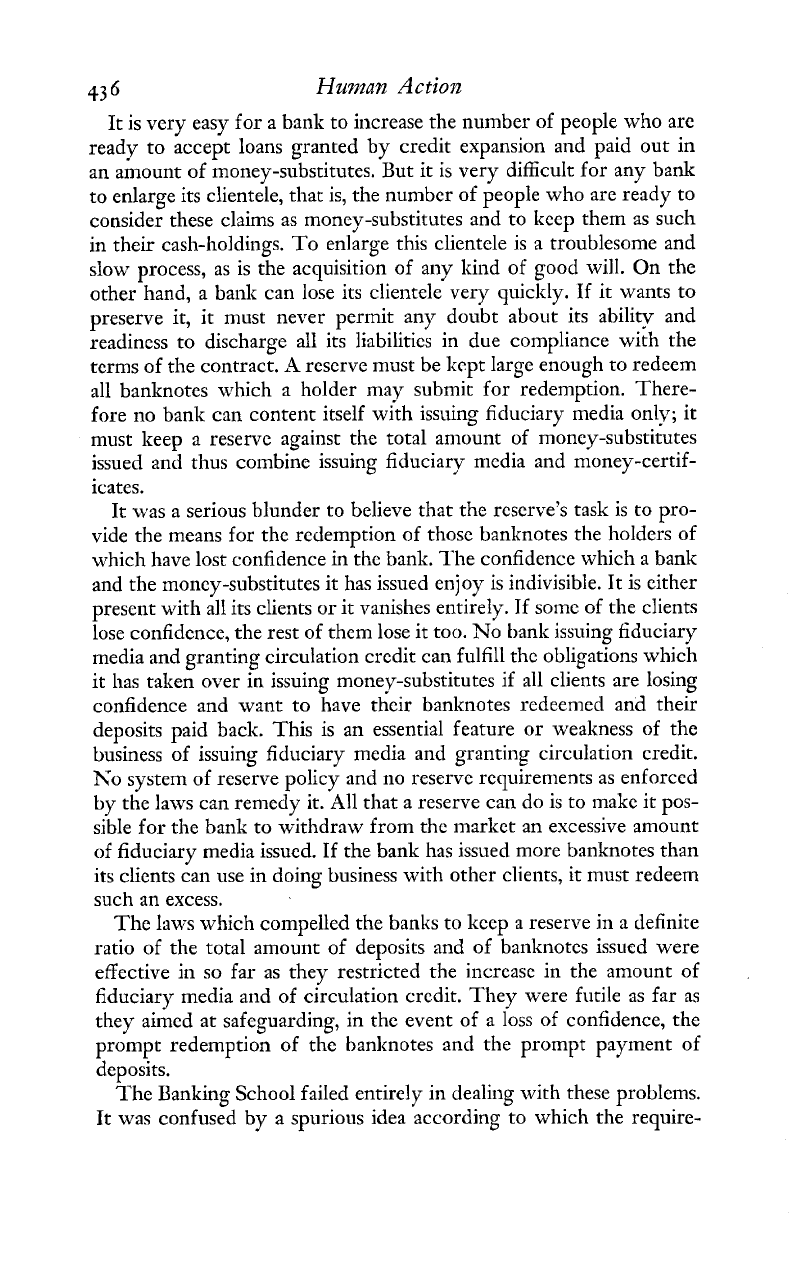
436
Huma~
Action
It is very easy for a bank to increase the number of people who are
ready to accept loans granted by credit expansion and paid out in
an amount of money-substitutes. But it is very difficult for any bank
to enlarge its clientele, that is, the number of people who are ready to
consider these claims as money-substitutes and to keep them as such
in their cash-holdings. To enlarge this clientele is a troublesome and
slow process, as is the acquisition of any kind of good will. On the
other hand, a bank can lose its clientele very quickly. If it wants to
preserve it, it must never permit any doubt about its ability and
readiness to discharge all its liabilities in due compliance with the
terms of the contract.
A
reserve must be licpt large enough to redeem
all banknotes which a holder may submit for redemption. There-
fore no bank can content itself with issuing fiduciary media only;
it
must keep a reserve against the total amount of money-substi&es
issued and thus combine issuing fiduciary media and rnoney-certif-
icates.
It was a serious blunder to believe that the reserve's task is to pro-
vide the means for the redemption of those banknotes the holders of
which have lost confidence in the bank. The confidence which a bank
and the money-substitutes it has issued enjoy is indivisible. It is either
present with all its clients or it vanishes entirely. If some of the clients
lose confidence, the rest of them lose it too. No bank issuing fiduciary
media and granting circulation credit can fulfill the oblig-ations which
it has taken over in issuing money-substitutes if all clients are losing
confidence and want to have their banknotes redeemed and their
deposits paid back. This is an essential feature or weakness of the
business of issuing fiduciary media and granting circulation credit.
KO system of reserve policy and no reserve requirements as enforced
by the laws can remedy it. All that a reserve can do is to make it pos-
sible for the bank to withdraw from the market an excessive amount
of
fiduciary media issued. If the bank has issued more banknotes than
its clients can use in doing business with other clients, it must redeem
such an excess.
The laws which compelled the banks to keep a reserve in a definite
ratio of the total amount of deposits and of banknotes issued were
effective in so far as they restricted the increase in the amount of
fiduciary media and of circulation credit. They were futile as far as
they aimed at safeguarding, in the event of a loss of confidence, the
prompt redemption of the banlmotes and the prompt payment of
deposits.
The Banking School failed entirely in dealing with these problems.
It
was confused by a spurious idea according to which the require-
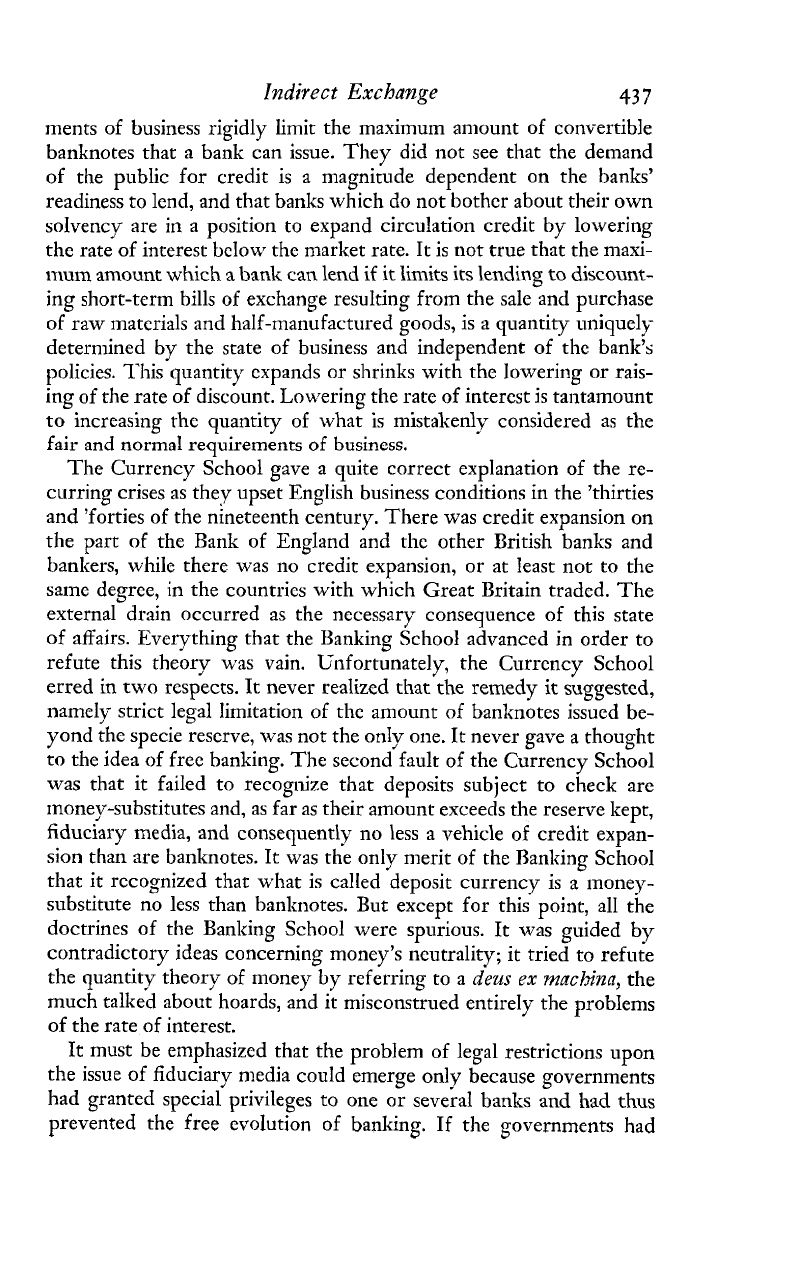
Indirect
Exchange
43
7
ments of business rigidly limit the maximum amount of convertible
banknotes that a bank can issue. They did not see that the demand
of the public for credit is a magnitude dependent on the banks'
readiness to lend, and that banks which do not bother about their own
solvency are in a position to expand circulation credit by lowering
the rate of interest below the market rate. It is not true that the maxi-
mum
amount which a
bank
can lend if it limits its lending to discount-
ing short-term bills of exchange resulting from the sale and purchase
of raw materials and half-manufactured goods, is a quantity uniquely
determined by the state of business and independent of the bank's
policies. This quantity expands or shrinks with the lowering or rais-
ing of the rate of discount. Lowering the rate of interest is tantamount
to increasing the quantity of what is mistakenly considered as the
fair and normal requirements of business.
The Currency School gave a quite correct explanation of the re-
curring crises as they upset English business conditions in the 'thirties
and 'forties of the nineteenth century. There was credit expansion on
the part of the Bank of England and the other British banks and
bankers, while there was no credit expansion, or at least not to the
same degree, in the countries with which Great Britain traded. The
external drain occurred as the necessary consequence of this state
of affairs. Everything that the IZanking School advanced in order to
refute this theory was vain. Unfortunately, the Currency School
erred in two respects. It never realized that the remedy it suggested,
namely strict legal limitation of the amount of banknotes issued be-
yond the specie reserve, was not the only one. It never gave a thought
to the idea of free banking. The second fault of the Currency School
was that it failed to recognize that deposits subject to check are
money-substitutes and, as far as their amount exceeds the reserve kept,
fiduciary media, and consequentl\; no less a vehicle
of
credit expan-
sion than are banknotes. It was
thk
only merit of the Banking School
that it recognized that what is called deposit currency is a money-
substitute no less than banknotes. But except for this point, all the
doctrines of the Banking School were spurious. It was guided by
contradictory ideas concerning money's neutrality; it tried to refute
the quantity theory of money by referring to a
deus
ex
macbinn,
the
much talked about hoards, and it misconstrued entirely the problems
of the rate of interest.
It must be emphasized that the problem of legal restrictions upon
the issue of fiduciary media could emerge only because governments
had granted special privileges to one or seveial banks and
had
thus
prevented the free evolution of banking. If the governments had
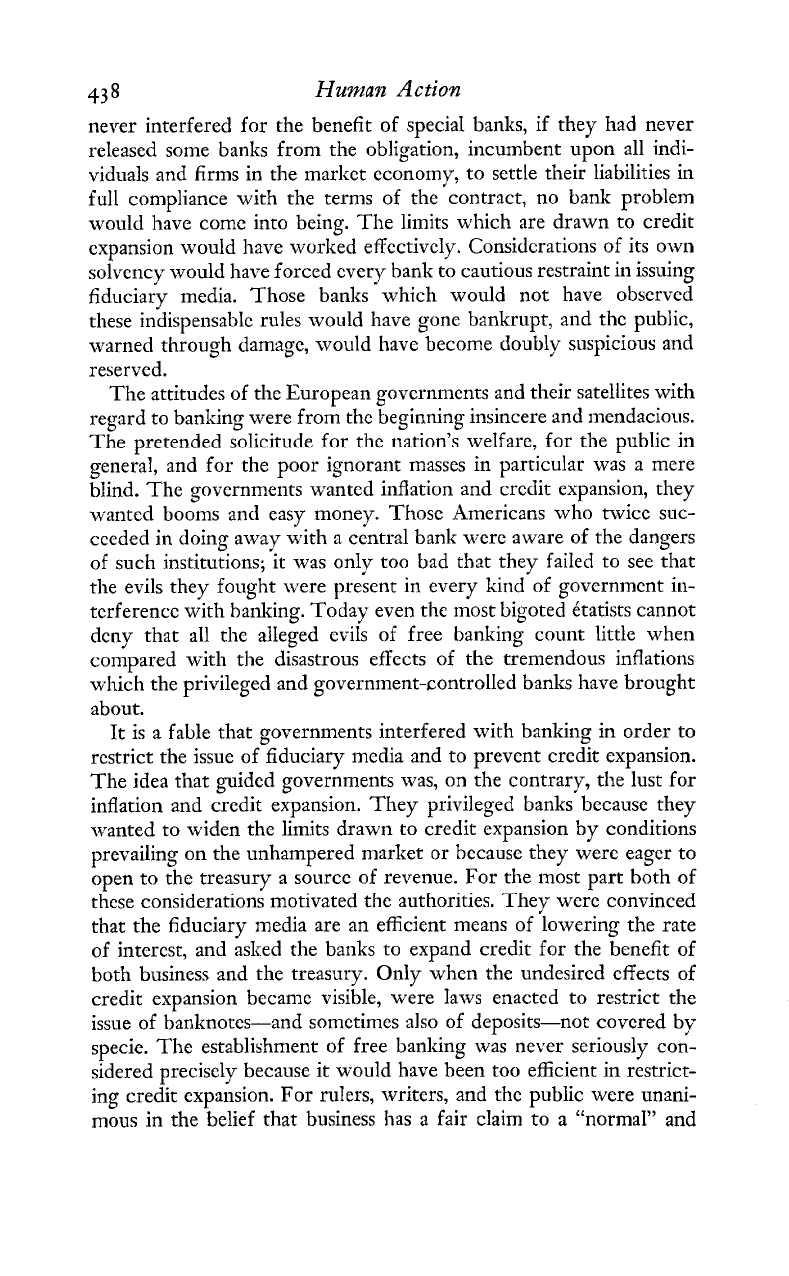
438
Human
Action
never interfered for the benefit of speciaI banks, if they had never
released some banks from the obligation, incumbent upon all indi-
viduals and firms in the market economy, to settle their liabilities in
full compliance with the terms of the contract, no bank problem
would have come into being. The limits which are drawn to credit
expansion would have worked effectively. Considerations of its own
solvency would have forced every bank to cautious restraint in issuing
fiduciary media. Those banks which would not have observed
these indispensable rules would have gone bankrupt, and the public,
warned through damage, would have become doubly suspicious and
reserved.
The attitudes of the European governments and their satellites with
regard to banking were from thc beginning insincere and mendacious.
The pretended solicitude for the nation's welfare, for the public in
general, and for the poor ignorant masses in particular was a mere
blind. The governments wanted inflation and credit expansion, they
wanted booms and easy money. Those Americans who twice suc-
ceeded in doing away with a central bank were aware of the dangers
of such institutions; it was only too bad that they failed to see that
the evils they fought \\.ere present in every kind of government in-
tcrferencc with banking. Today even the most bigoted Ctatists cannot
deny that a11 the alleged evils of free banking count little when
compared with the disastrous effects of the tremendous inflations
which the privileged and government-controlled banks have brought
about.
It is
a
fable that governments interfered with banking in order to
restrict the issue of fiduciary media and to prevent credit expansion.
The idea that guided governments was, on the contrary, the lust for
inflation and credit expansion. They privileged banks because they
wanted to widen the limits drawn to credit expansion by conditions
prevailing on the unhampered market or because they were eager to
open to the treasury a source of revenue. For the most part both of
these considerations motivated the authorities. They were convinced
that the fiduciary media are an efficient means of lowering the rate
of interest, and asked the banks to expand credit for the bcnefit of
both business and the treasury. Only when the undesired effects of
credit expansion became visible, were laws enacted to restrict the
issue of banknotes-and sometimes also of deposits-not covered by
specie. The establishment of free banking was never seriously con-
sidered precisely because it would have been too efficient in restrict-
ing credit expansion. For rulers, writers, and the public were unani-
mous in the belief that business has a fair claim to a "normal" and
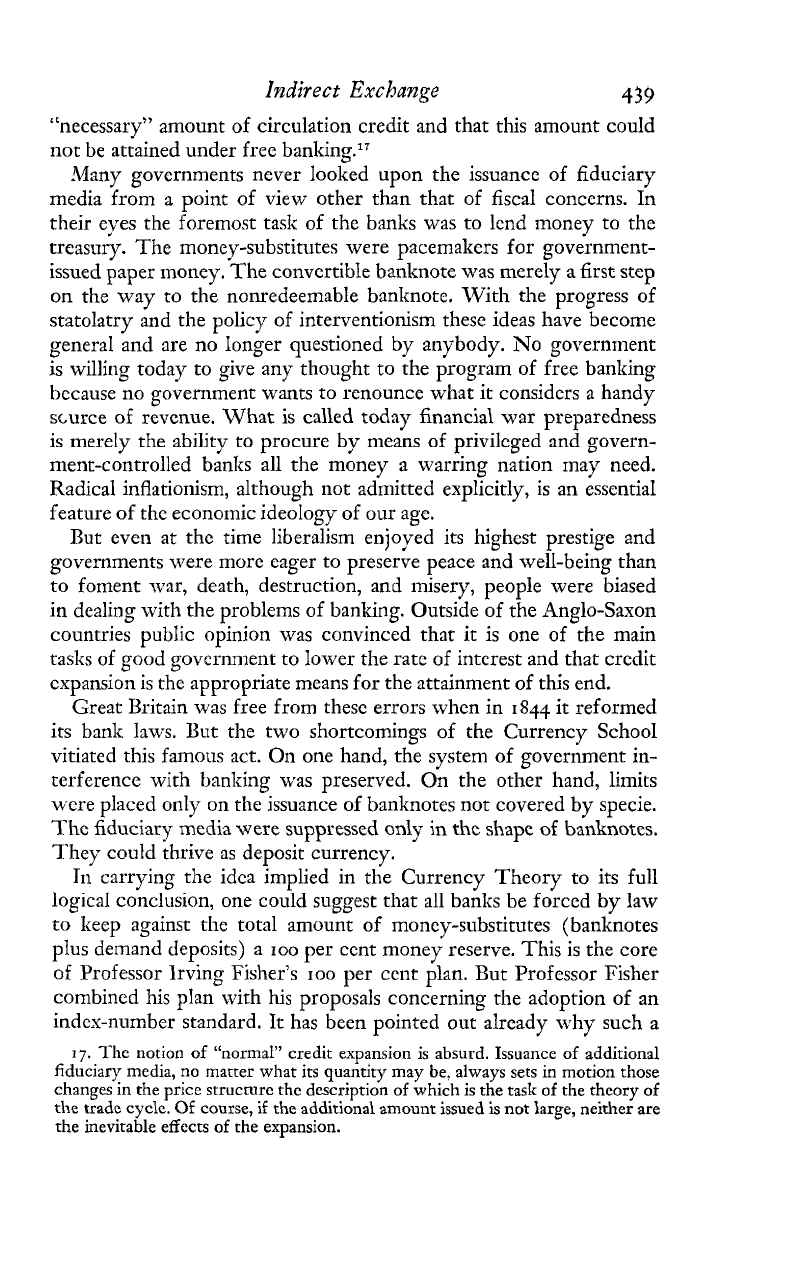
Indirect Exchange
439
'hecessary" amount of circulation credit and that this amount could
not be attained under free banking1'
Many governments never looked upon the issuance of fiduciary
media from a point of view other than that of fiscal concerns. In
their eves the foremost task of the banks was to lend money to the
treasury. The money-substitutes were pacemakers for government-
issued paper money. The convertibIe banknote was merely a first step
on the way to the nonredeemable banknote. With the progress of
statolatry and the policy of interventionism these ideas have become
general and are no longer questioned by anybody. No government
is willing today to give any thought to the program of free banlting
lxxause no government wants to renounce what it considers a handy
scurce
of
revenue.
What
is called today financial war preparedness
is merely the ability to procure by means of privileged and govern-
ment-controlled banks all the money a warring nation may need.
Radical inflationism, although not adrnitted explicitly, is an essentia1
feature of the economic ideology of our age.
nut even at the time liberalism enjoyed its highest prestige and
governments were more eager to preserve peace and welI-being than
to foment mar, death, destruction, and misery, people were biased
in dealing with the problems of banking. Outside of the Anglo-Saxon
countries public opinion was convinced that it is one of the main
tasks of good government to lower the rate of interest and that credit
expansion is the appropriate means for the attainment of this end.
Great Britain was free from these errors when in
1844
it reformed
its bank laws. But the two shortcomings of the Currency School
vitiated this famous act. On one hand, the system of government in-
terference with banking was preserved. On the other hand, limits
were placed only on the issuance of banknotes not covered by specie.
The
fiduciary media were suppressed only
in
the shape of
banknotes.
They could thrive as deposit currency.
111
carrying the idea implied in the Currency Theory to its full
logical conclusion, one could suggest that all banks be forced by law
to keep against the total amount of money-substitutes (banknotes
plus demand deposits) a ioo per ccnt money reserve. This is the core
of Professor Irving Fisher's ioo per ccnt plan. But Professor Fisher
combined his plan with his proposals concerning the adoption of an
index-number standard. It has been pointed out already why such a
17.
The notion of "normaIn credit expansion is absurd. Issuance of additional
fiduciary media, no matter what its quantity may
be:
always sets in motion those
changes in the price structure the description of which is the task of the theory of
the
trade
cycle.
Of
course,
if
the
additional amount issued
is
not large, neither are
the inevitable effects of the expansion.
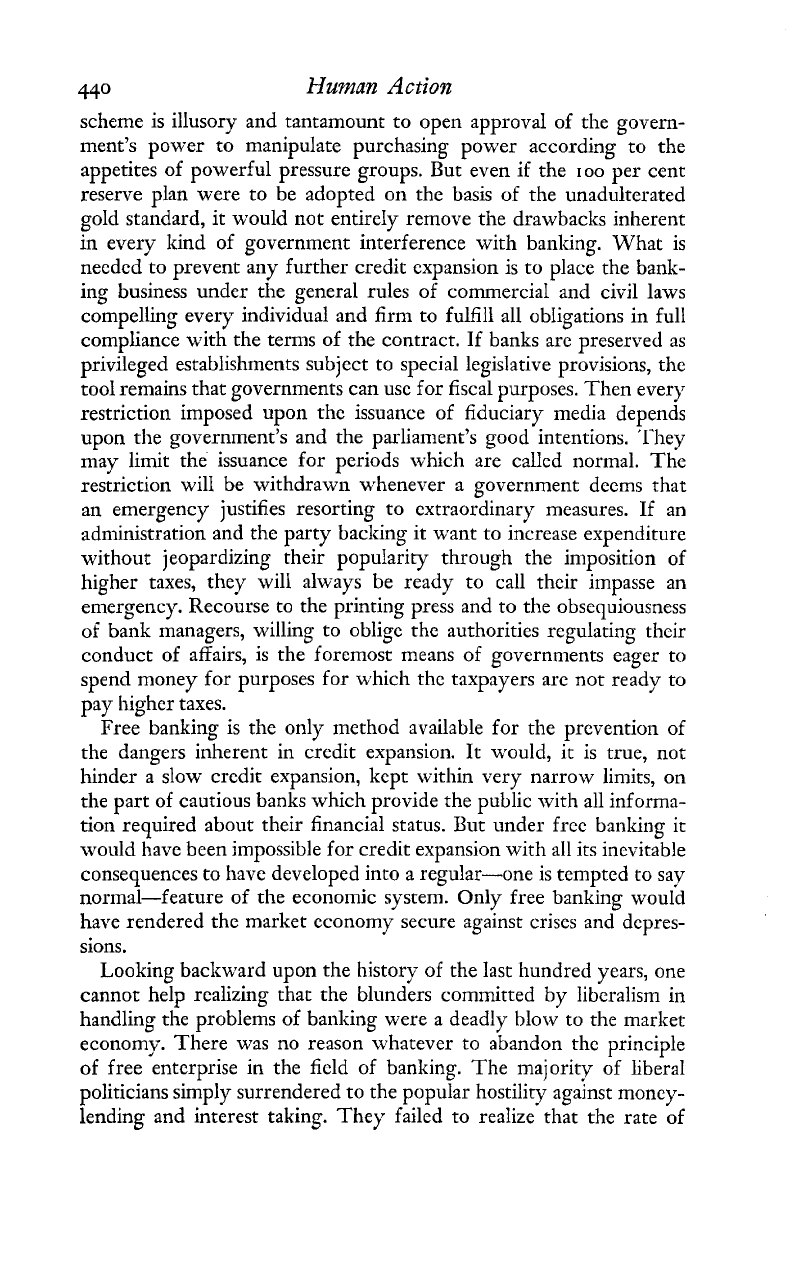
440
Human
Action
scheme is illusory and tantamount to open approval of the govern-
ment's power to manipulate purchasing power according to the
appetites of powerful pressure groups. But even if the
IOO
per cent
reserve plan were to be adopted on the basis of the unadulterated
gold standard, it would not entireIy remove the drawbacks inherent
in every kind of government interference with banking. What is
needed to prevent any further credit expansion is to place the bank-
ing business under the general rules of commercia1 and civil laws
compelling every individual and firm to fulfill all obIigations in full
compliance with the terms of the contract. If banks are preserved as
privileged establishments subject to special legislative provisions, the
tool remains that governments can use for fiscal purposes. Then every
restriction imposed upon the issuance of fiduciary media depends
upon the government's and the padiament's good intentions. 'llley
may limit the issuance for periods which are called normal. The
restriction will be withdrawn whenever a government deems that
an emergency justifies resorting to extraordinary measures. If an
administration and the party backing it want to increase expenditure
without jeopardizing their popularity through the imposition of
higher taxes, they will always be ready to call their irnpasse an
emergency. Recourse to the printing press and to the obsequiousness
of bank managers, willing to oblige the authorities regulating thcir
conduct of affairs, is the foremost means of governments eager to
spend money for purposes for which the taxpayers are not ready to
pay higher taxes.
Free banking is the only method available for the prevention of
the dangers inherent in credit expansion. It would, it is truc, not
hinder a slow credit expansion, kept within very narrow limits, on
the part
of
cautious banks which provide the public with all informa-
tion required about their financial status. But under free banking it
would have been impossible for credit expansion with all its inevitable
consequences to have developed into a regular-one is tempted to say
normai-feature of rhe economic system. Only free banking wouici
have rendered the market economy secure against crises and depres-
sions.
Looking backward upon the history of the last hundred years, one
cannot help realizing that the blunders committed by liberalism in
handling the problems of banking were a deadly blow to the market
economy. There was no reason whatever to abandon the principle
of free enterprise in the field of banking. The majority of liberal
politicians simply surrendered to the popular hostility against money-
lending and interest taking. They failed to realize'that the rate of
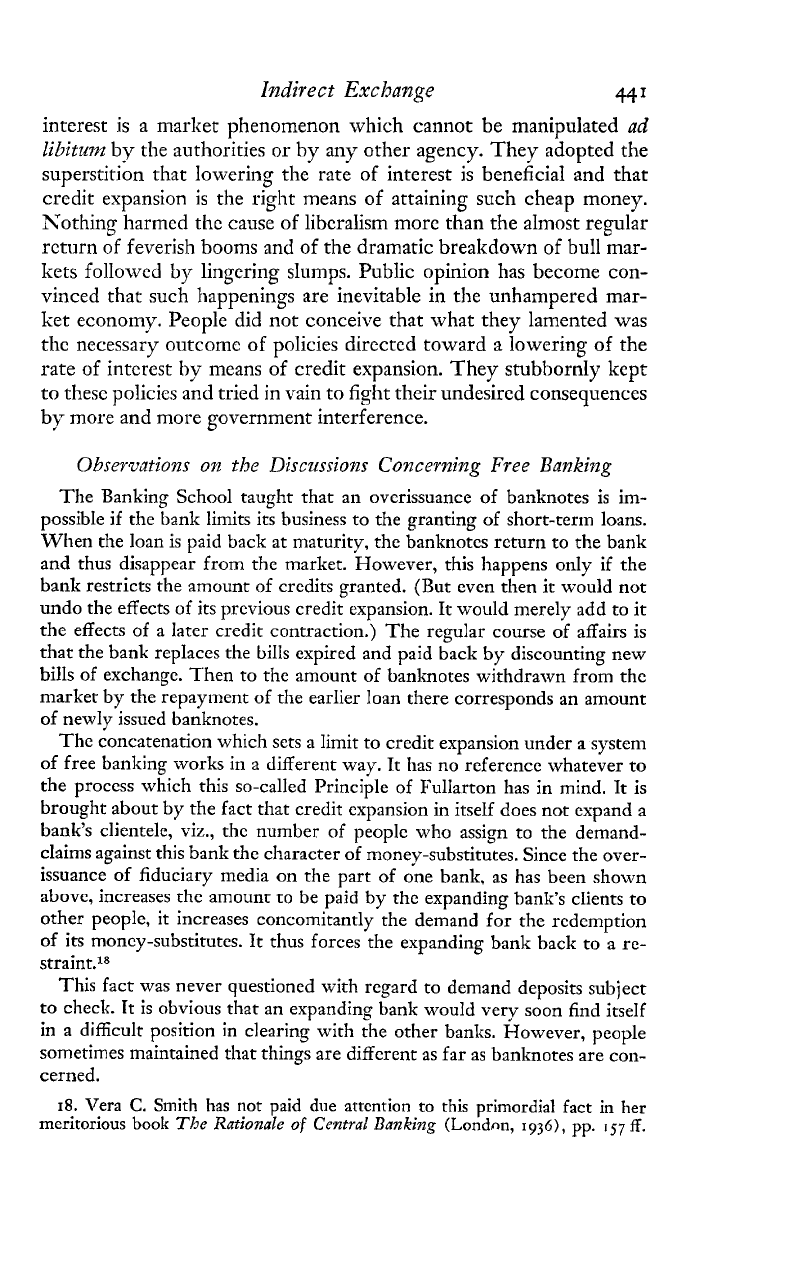
Indirect
Exchange
441
interest is a market phenomenon which cannot be manipulated
ad
libitum
by the authorities or by any other agency. They adopted the
superstiti& that lowering the rate of interest is beneficial and that
credit expansion is the right means of attaining such cheap money.
Nothing harmed the cause of liberalism more than the almost regular
rcturn of feverish booms and of the dramatic breakdown of bull mar-
kets followed
by
lingering slumps. Public opinion has become con-
vinced that such happenings are inevitable in the unhampered mar-
ket economy. People did nor conceive that what they lamented was
the necessary outcome of policies directed toward a lowering of the
rate of interest by means of credit expansion. They stubbornly kept
to these policies and tried in vain to fight their undesired consequences
by more and more government interference.
Observdons on the Di~cwssions Concerning Free Banking
The Banking School taught that an overissuance of banknotes is im-
possible if the bank limits its business to the granting of short-term loans.
When the loan is paid back at maturity, the banknotes rcturn to the bank
and thus disappear from the market. However, this happens only if the
bank restricts the amount of credits granted. (Rut even then it would not
undo the effects of its previous credit expansion. It would merely add to it
the effects of a later credit contraction.) The regular course of affairs is
that the bank rcplaces the bills expired and paid back by discounting new
bills of exchange. Then to the amount of banknotes withdrawn from the
market by the repayment of the earlier loan there corresponds an amount
of newly issued banknotes.
The concatenation which sets a limit to credit expansion under a system
of free banking works in a different way. It has no reference whatever to
the process which this so-called Principle of Fullarton has
in
mind. It is
brought about by the fact that credit expansion in itself does not expand a
bank's clientele, viz., the number of people who assign to the demand-
claims against this bank the character of money-substitutes. Since the over-
issuance of fiduciary media on the part of one bank, as has been shown
above, increases the amounr to be paid by the expanding bank% ciients to
other people, it increases concomitantly the demand for
the
redemption
of its moncy-substitutes. It thus forces the expanding bank back to a re-
straint.18
This fact was never questioned with regard to demand deposits subject
to check. It is obvious that an expanding bank would very soon find itself
in a difficult position in clearing with the other banks. However, people
sometimes maintained that things are different as far as banknotes are con-
cerned.
18. Vera
C.
Smith has not paid due
attention
to
this primordial fact in her
meritorious book
The Rationale
of
Central
Banking
(Londnn,
1936),
pp.
157
ff.
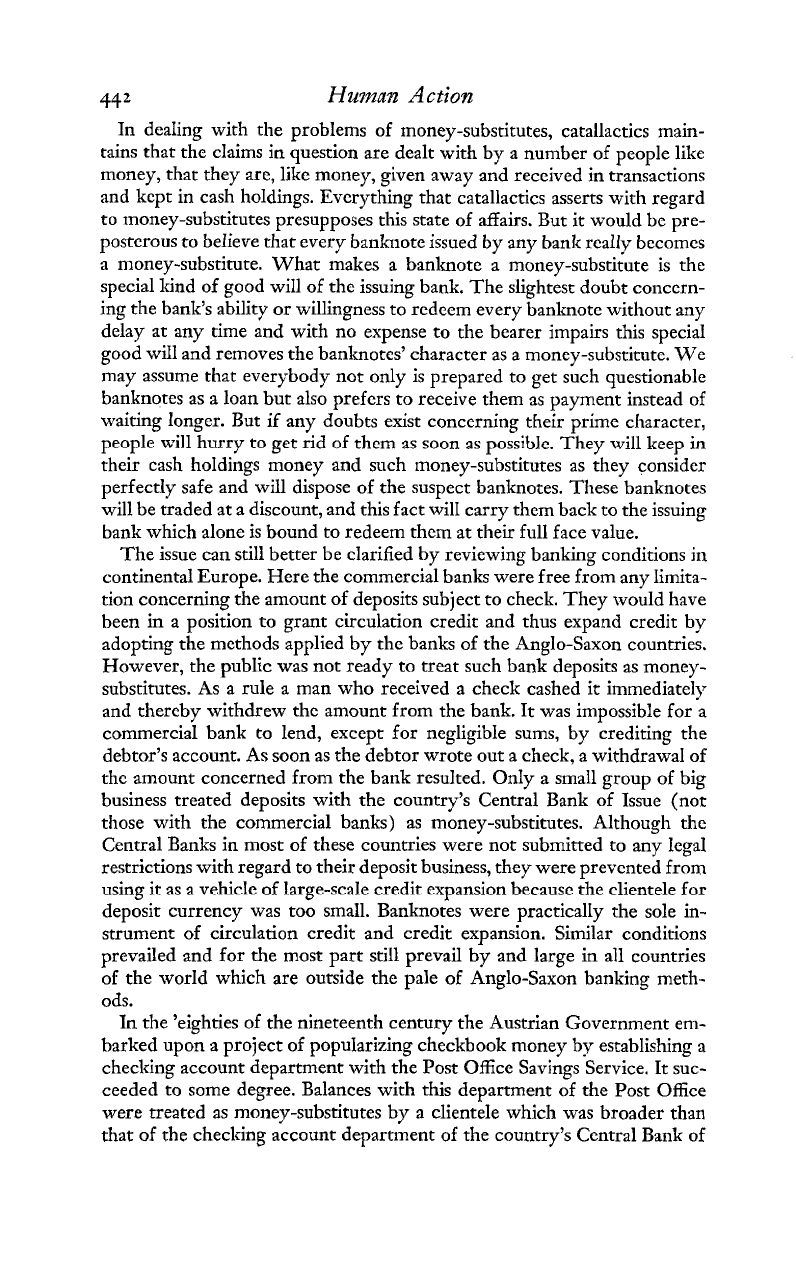
442
Hu7nan
Action
In deaIing with the problems of money-substitutes, catallactics main-
tains that the claims in question are dealt with by a number of people like
money, that they are, like money, given away and received in transactions
and kept in cash holdings. Everything that catallactics asserts with regard
to money-substitutes presupposes this state of affairs. But it would be pre-
posterous to beIieve that every banknote issued by any bank really becomes
a
money-substitute. What makes a banknote a money-substitute is the
special kind of good will of the issuing bank. The slightest doubt concern-
ing the bank's ability or willingness to redeem every banknote without any
delay at any time and with no expense to the bearer impairs this special
good will and removes the banknotes' character as a money-substitute. We
may assume that everybody not only is prepared to get such questionable
banknotes as a loan but also prefers to receive them as payment instead of
waiting longer. But if any doubts exist concerning their prime character,
people will hurry to get rid of them as soon as possible. They will keep in
their cash holdings money and such money-substitutes as they consider
perfectly safe and will dispose of the suspect banknotes. These banknotes
will be traded at a discount, and this fact wilI carry thcm back to the issuing
bank which alone is bound to redeem thcm at their full face value.
The issue can still better be clarified by reviewing banking conditions
in
continental Europe. Here the commercial banks were free from any limita-
tion concerning the amount of deposits subject to check. They would have
been in a position to grant circulation credit and thus expand credit by
adopting the methods applied by the banks of the Anglo-Saxon countries.
However, the public was not ready to treat such bank deposits as money-
substitutes. As a rule a man who received a check cashed it immediately
and thereby withdrew the amount from the bank. It was impossible for a
commercial bank to lend, except for negligibIe sums, by crediting the
debtor's account. As soon as the debtor wrote out a check, a withdrawal of
the amount concerned from the bank resulted. OnIy a small group of big
business treated deposits with the country's Central Bank of Issue (not
those with the commercial banks) as money-substitutes. Although the
Central Banks in most of these countries were not submitted to any legal
restrictions with regard to their deposit business, they were prevented from
using it as a vehicle of large-scale credit expansion because the clientele for
deposit currency was too small. Banknotes were practicalIy the sole
in-
strument of circulation credit and credit expansion. Similar conditions
prevailed and for the most part still prevail by and large in all countries
of the world which are outside the pale of Anglo-Saxon banking meth-
ods.
In the 'eighties of the nineteenth century the Austrian Government em-
barked upon a project of popularizing checkbook money by establishing a
checking account department with the Post Office Savings Service. It suc-
ceeded to some degree. Balances with this department of the Post Office
were treated as money-substitutes by
a
clientele which was broader than
that of the checking account department of the country's Central Bank of
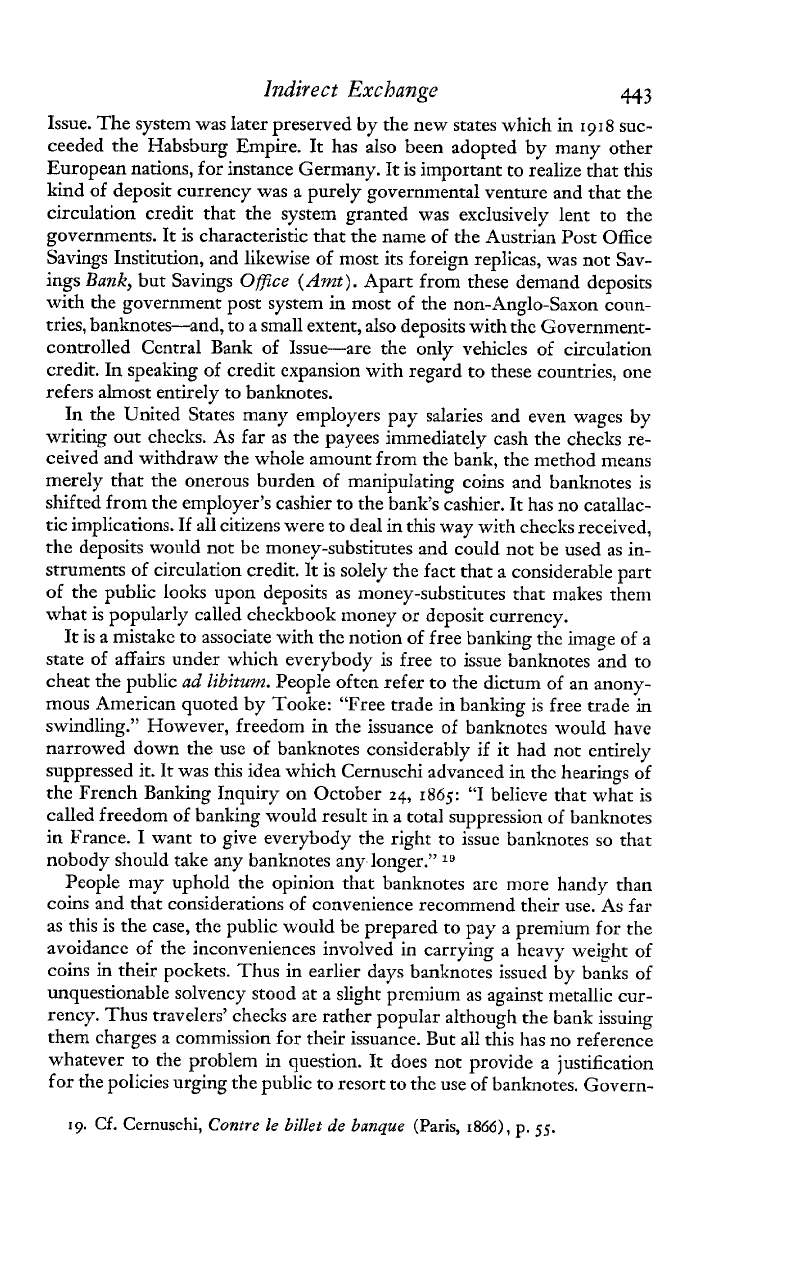
Indirect
Exchange
443
Issue. The system was later preserved by the new states which in 191
8
suc-
ceeded the Habsburg Empire. It has also been adopted by many other
European nations, for instance Germany. It is important to realize that this
kind of deposit currency was a purely governmental venture and that the
circulation credit that the system granted was exclusively lent to the
governments. It is characteristic that the name of the Austrian Post Office
Savings Institution, and likewise of most its foreign replicas, was not Sav-
ings
Bank,
but Savings
Ofice
(Amt).
Apart from these demand deposits
with the government post system in most of the non-Anglo-Saxon com-
tries, banknotes-and, to a small extent, also deposits with the Government-
controlled Central Bank of Issue-are the only vehicles of circulation
credit. In speaking of credit expansion with regard to these countries, one
refers almost entirely to banknotes.
In the United States many employers pay salaries and even wages by
writing out checks. As far as the payees immediately cash the checks re-
ceived and withdraw the whole amount from the bank, the method means
merely that the onerous burden of manipdating coins and banknotes is
shifted from the employer's cashier to the bank's cashier. It has no catallac-
tic implications. If all citizens were to deal in this way with checks receivcd,
the deposits would not be money-substitutes and could not be used as in-
struments of circulation credit. It is solely the fact that a considerable part
of the public looks upon deposits as money-substitutes that makes them
what is popularly called checkbook money or dcposit currency.
It is a mistake to associate with the notion of free banking the image of a
state of affairs under which everybody is free to issue banknotes and to
cheat the public
ad
libitum.
People often refer to the dictum of an anony-
mous American quoted by Tooke: "Free trade in banking is free trade in
swindling." However, freedom in the issuance of banknotes would have
narrowed down the use of banknotes considerably if it had not entirely
suppressed it. It was this idea which Cernuschi advanced in thc hearings of
the French Banking Inquiry on October
24,
1865:
"I believe that what is
called freedom of banking would result in a total suppression of banknotes
in France. I want to give everybody the right to issue banknotes so that
nobody should take any banknotes any longer."
People may uphold the opinion that banknotes are more handy than
coins and that considerations of convenience recommend their use. As far
as this is the case, the public would be prepared to pay a premium for the
avoidance of the inconveniences involved in carrying a heavy weight of
coins in their pockets. Thus in earlier days banknotes issued by banks of
unquestionable solvency stood at
a
slight premium as against rnetallic cur-
rency. Thus travelers' checks are rather popular although the bank issuing
them charges a commission for their issuance. But all this has no reference
whatever to the problem in question. It does not provide a justification
for the policies urging the public to resort to the use of banknotes. Govern-
19.
Cf.
Cernuschi,
Contre
le
billet de
banque
(Paris,
1866),
p.
55.
